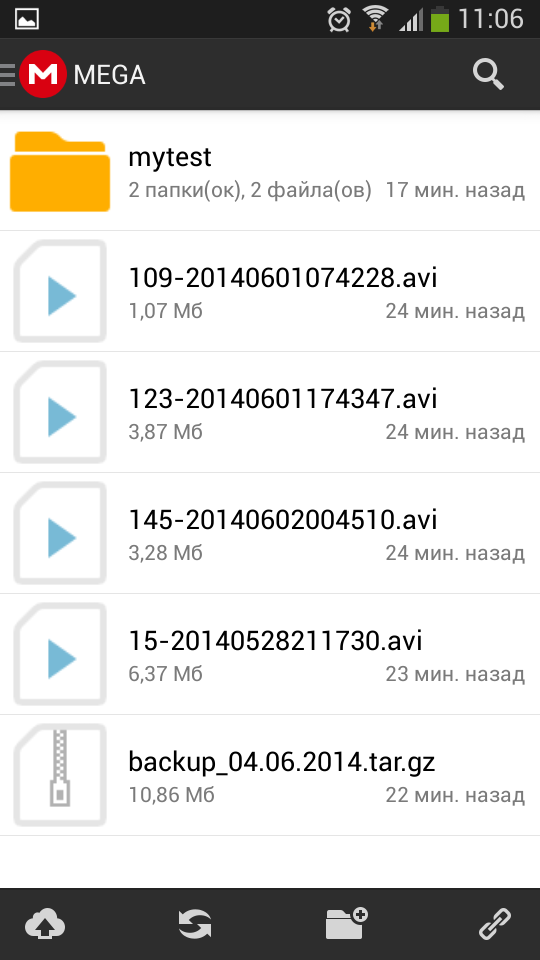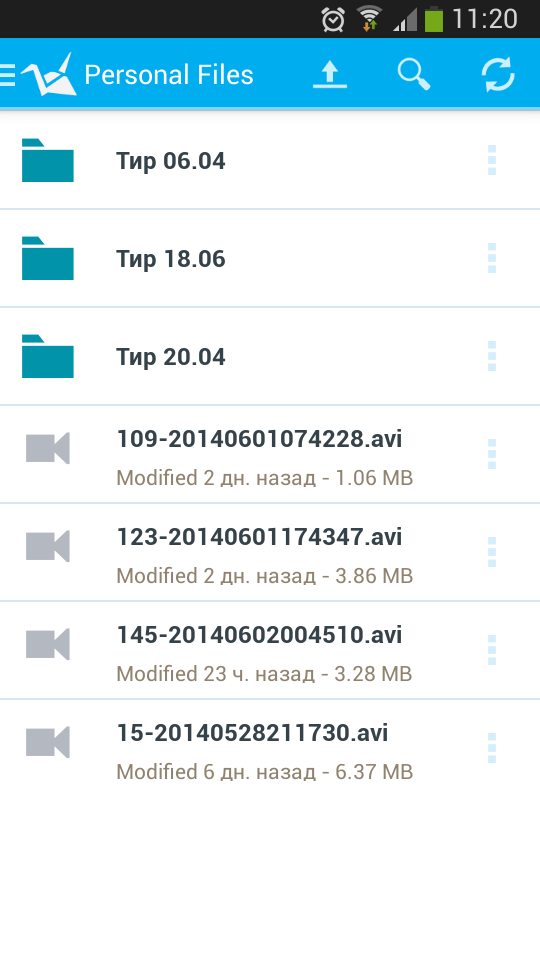A cloud in pants

There are now a large number of different so-called Cloud storage systems. They were created, for the most part, for the convenience of accessing data for an ordinary user from any end of the globe and from any device, including mobile.
The cloud storage market is very saturated: there are both foreign solutions and domestic ones.
For example, some of the most famous foreign ones are: Dropbox.com , GoogleDrive , Microsoft OneDrive
From domestic: Yandex.Disk , Cloud Mail.ru
')
Each of the above has both advantages and disadvantages.
For example, Dropbox will give you only 2GB of disk space for free, which is clearly less compared to free 10GB from Yandex.Disk, but Dropbox has a file version control system, which may be very important for someone.
Mail.Ru will give you 100GB (they even gave you 1TB if you installed their software, but it seems they covered this “freebie”), but the software does not work under the Linux console, there isn’t even support for WebDAV.
(UPD.: In the comments they wrote that at: https://webdav.cloud.mail.ru/ there is a BETA version of WebDAV, but how it will work now and how it will work further is not known. Use on your own and risk) .
For some, these subtleties are not important, but it is fundamentally necessary for someone to, for example, make backup copies of their photos to the cloud using the command line of a home router.
Also, if you upload files to MAIL.RU through a web-muzzle, then the limit on its maximum capacity works: 2GB, and if you upload using a native client, then the max file size can be 32GB. Whether it is critical or not is an individual question.
Personally, I belong to the category of users who need as much free storage space as possible and to be able to work with storage in Linux without a graphical shell. A big plus will be the possibility of picking up this storage from a mobile device (smartphone / tablet), because we need a “cloud of pants”.
What is suitable for such criteria? Of the free - not a lot.
Yandex.Disk free and permanently allow you to use 10GB of disk space.
To work with the storage there is a special software that works in the linux-console: yandex-disk
In Debian, Linux is installed literally with one command. Here is a description of the installation and use .
I myself am currently using it, but my archive has already grown to the limit of 10 GB and there will not be any free space soon. I want something more.
So our requirements are:
- Free;
- Enough capacious storage;
- Ability to upload large files (at least 4 GB);
- Availability of at least a client for the Linux console, as well as a maximum of a client for mobile devices.
Someone may exclaim:
Dear, open your owncloud and use the volume that you want.
To which I will answer:
And where is free to find the hardware for the server storage and the person who will administer it (replacing the outgoing drives, burnt power supplies, etc.)?
Of course, I can find in some dump the guts from old computers, collect all this “server” and hang one more piece of metal around my neck, which will require care (as if I have no other business). Well, it does not happen that everything worked perfectly and without failures, according to the law of meanness somewhere something goes wrong, trite ownCloud software and glukanet and at the crucial moment everything will fall down. In general, we need the repository as a service, and not as a server :) Let adminit someone else.
In general, I have sketched a small list of what can be obtained under more or less normal conditions and for free:
- Mail.Ru Cloud - 100GB at registration . File size up to 2GB (via the web interface), up to 32GB (via the native client).
- Yandex.Disk - Maximum disk capacity 10 GB , information is stored on the disk indefinitely. You can connect as a folder through the native client (there is a console software for Linux) or WebDAV.
- Google Drive - 15GB free . You can connect as a folder through the native client. In Linux, you can connect via WebDAV.
- Windows Live SkyDrive (OneDrive) - Free 7GB for new accounts, 25Gb for old ones. There is a native client for Windows, Mac, iPad and mobile devices. The file size limit is 100MB. In Linux, you can connect via WebDAV.
- OziBox - Free 100GB . Positions itself as an alternative to Drobox and Googledrive. I did not find support for Linux.
- Amazon S3 - Free 5GB for one year only. Any data, most platforms. Can be connected via WebDAV
- Dropbox - 2GB for free . Any data, most platforms. You can connect as a folder through the native client. Free space can be expanded by various promotions.
- iCloud - 5GB free for Apple users.
- Box.net - 10GB for free . The maximum file size is 250Mb. Ability to fill folders (slow Java script). One-time limit on filling - 100 files, the limit does not apply to filling folders. There is a webdav.
- Bitcasa.com - Free 20GB , you can increase the money. Limit file size for web access: 2GB. If the native client, then there are no restrictions on the file size. There is a client for Linux, but did not check whether the console.
I also came across the resource minus.com , but this seems to be an alternative to Instagram (only without a stupid restriction on the aspect ratio of the picture) and not exactly what we are looking for.
And there is also a monstrous Chinese storage YunPan360. There you can get 36TB (terabyte) for free and increase it further by completing special quests. Some people have clocked up the storage capacity of your account to 100TB. The problem is that the software is only under Windows and Android. WebDAV is not. Individuals deploy a virtual machine with Windows and upload files to the cloud in transit through a virtual machine, but, in my opinion, this is a crutch. In general, while it does not suit us (but I still got an account for every fireman).
So, this is what may suit us from the fact that it did not fall into the above described list:
Mega.co.nz
URL: https://mega.co.nz/
She's just "Mega." They give 50GB for free and there is a client for Windows. For Linux and the rest, they plan to release the client a little later, but whether the console version is not known.
The network has alternative applications for working with Mega, but all of them are unstable, buggy and fall off.
The only thing that seems to work more or less stably is this solution:
http://megatools.megous.com/
on my Debian 7 got up and running.
The service is foreign, because the speed of downloads / downloads may vary depending on the geographical location + there is something like control over activity on Mega. If you drive tens of gigabytes in short periods of time, the speed can be cut temporarily (by 30 minutes).
Since My storage is filled with a large number of small files - I'm not afraid.
Put so:
Download the archive (I have Debian x64):
wget megatools.megous.com/builds/megatools-1.9.91-debian-wheezy-amd64.tar.gzunpack If you unpack to the root of the system, then all the binaries and libs will be scattered where necessary.
Now let's look at the information on the repository:
megadf -h -u mister-blister@pochta.com -p moyparol1123Displays something like:
Total: 50,0
Used: 0
Free: 50,0If the console type varnings like:
«dbus-launch --autolaunch=174196e0fb6ad20eef21a078520f2e6b --binary-syntax --close-stderr» 1: Autolaunch error: X11 initialization failed.\nThat command can be executed like this:
dbus-launch megadf -h -u mister-blister@pochta.com -p moyparol1123To view the list of files there is a command:
megals -h -u mister-blister@pochta.com -p moyparol1123If we want to upload files from the "/ root / mytest" folder to the cloud, then we do it like this:
megaput /root/mytest/* -u mister-blister@pochta.com -p moyparol1123You can, for example, create a folder in the repository:
megamkdir /Root/mytest -u mister-blister@pochta.com -p moyparol1123(note, the path to the remote folder is written in full)
and then synchronize to it the contents of some of our local folders:
megasync --local /root/mytest/ --remote /Root/mytest -u mister-blister@pochta.com -p moyparol1123A full list of commands and examples of their use are in the official man or at: http://megatools.megous.com/man/megatools.html
There you can read how to automate password and login (use a special rc-file)
By the way, when the megaput or megasync team worked with downloading files to the cloud, the load on my server's CPU (Intel® Atom (TM) CPU D525) was 1.3-2.0% . For comparison, Yandex.Disk in the same conditions for synchronization takes 1.7% , but with a subsidence of up to 200% + during initialization (apparently, when building a list of non-synchronized data). Also periodically, when all the directories are already “Up to date”, Yandex.Disk does a periodic check and it takes 1-2% of CPU, but the truth is, quite briefly. To the credit of the product from Yandex, I want to add that the speed of work / loading is still really impressive (there are no overhead costs for traffic movement, since the DC is located in Russia)
As I wrote above, there are applications for mobile devices. I was able to test only on my combat Android (the old IPhone-3 from the far box was frankly lazy)
The Android client looks like this:


No complaints about the work, everything is smooth and accurate (and fast enough)
Now let's see another repository.
COPY.COM
URL: https://copy.com (before there was a referral link, but the moderators punished me for it)
Another foreign service.
When registering immediately give free 15Gb . If you registered by referral link, then you will be given + 5Gb for free and forever, but on condition that you install the application to work with this service (immediately after installation, you can remove the application :-) if you don’t like to install anything extra).
After authorization in your account, you can create your referral link and distribute it to your friends. For each friend listed, they will give + 5Gb to you and + 5Gb to each friend + 2GB for advertising tweet. It seems to me very humane. Theoretically, in this way, the storage capacity can be increased by a very, very much. In practice, I was able to increase my storage by 15Gb by registering 3 new accounts via my referral link to my alternative mailboxes (I simply got tired of doing even more “left” accounts)
This service has client applications: Windows, Mac, Android, iOS and, most importantly, Linux (console and qt).
In Debian 7 it works well, there are no complaints, it synchronizes on the fly. The Windows application also works without problems, but the Android application crashed for me a couple of times, but was re-launched. The Android application is often updated, after the latest updates (at the end of June 2014), the flights stopped.
This is what the Android client looks like:

On Linux, we run it like this.
We pull the archive with the application:
wget copy.com/install/linux/Copy.tgzUnpacking
Go to the directory of the unpacked archive, inside there are directories:
armv6h/
x86/
x86_64/in which lies the distribution under 32-, 64-bit OS and under ARM.
Go to the desired directory and execute the command:
./CopyConsole -u=mister-blister@pochta.com -r=/root/copycom/ -p=moyparol1123where, after the -u key, a login is written (it is an e-mail address), after the -p key, the password, and after -r , the directory that needs to be synchronized with the “cloud”.
After launch, something like this will pop up to the console:
User from cmdline mister-blister@pochta.com
Root from cmdline /root/copycom
Password from cmdline
Starting copy...success
Logged in as user: 'mister-blister@pochta.com' Copy folder is: '/root/copycom'
All files up to dateIn the “All files up to date” state, the process on my server (Intel® Atom (TM) CPU D525) occupied 0.3–1% CPU.
When downloading a file to the cloud, the load “walked” from 1.7% to 5%, but mostly kept in the range of 1.7-3%
Brief summary
If you don’t need a lot of space, Yandex.Disk is quite suitable. With applications for Linux and smartphones everything is fine there, and the download speed is good.
If you are a
Mega will give you a fixed amount of disk for free, and Copy will allow you to increase it indefinitely due to the referral system.
My choice is https://copy.com . Here you can store a lot of things, and from a smartphone you can always access the saved data.

Thank you all for your attention.
Source: https://habr.com/ru/post/224961/
All Articles